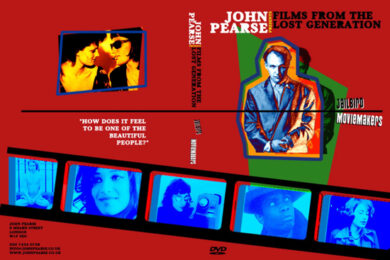It takes a very impressive commitment to obscurity to elude even the terrifyingly thorough search engines and data aggregators that plunder our every digital thought for monetizable information. Typing the name ‘John Pearse’ – even when coupled with the title of his 1971 film The Moviemakers – very nearly confounds the internet. This, in itself, is something of an achievement. For the last five years, I’ve occasionally typed Pearse’s name and the title into various corporate search engines in the hope of turning up any traces of the man and his other work. The picture itself, an extraordinarily atmospheric gaze into the dark crystal of London in the late ’60s, has lingered in my consciousness ever since I saw it years before.
John Pearse fell into filmmaking by accident. To hear him tell the story, it was all the result of an off-hand comment by Federico Fellini on a beach:
"I wound up in Rome and I thought I might get a job as an extra. And Fellini was making Satyricon at the time, and a very good friend of mine, a model, Donyale Luna was appearing in Satyricon and some other films of his as well. On Friday nights there would be a big dinner party chez Federico, and, of course, so the movie continues. We go to the beach, Donyale starts to wade out to sea, and she thinks she’s Bardot, Joan of Arc, and Federico is saying, ‘Donyale, come back, come back.’ But she’s going out to sea. Fredercio says, ‘Brother John, can’t you do something?’ And I said: ‘Donyale, if you don’t come back, we’re all going to fuck off and leave you here.’ And Fellini said, ‘Brother John, you’d make a great movie director.’"
The idea clearly appealed to Pearse, who was at the time, ephemerally attached to the world of fashion. His early video work primarily consisted of footage of a fashion show by Ossie Davis. Pearse went on to direct some shorts, notably Jailbird, a silent picture with an uproarious jazz soundtrack which tells the tale of a down and out young woman trying and failing to make her way in London. Jailbird‘s mixture of tragedy and picaresque comedy resembles a vignette from something like a modern Decameron, set between Carnaby Street and Archway.
The Moviemakers is, to date, Pearse’s only feature. It is likely to remain so. He left the movie business after its tepid and, in some cases, lazily hostile reception. The film was, at the time, dismissed as a vacuous Warhol homage and disappeared down the cinematic memory hole for decades, save for up-all-night screenings on ITV in the mid-’80s.
While it is certainly true that The Moviemakers embraces the spirit and openness of Warhol’s shambolic masterpieces, in place of the Zen-like placidity that was Warhol’s trademark, Pearse brings a weather-beaten romanticism. He told me he thought of his film as "a kind of requiem for the King’s Road", and to see The Moviemakers is to see a part of London that itself would almost seem to be acting. The youthful abandon and perversity that was so clearly a part of the day-to-day ecology of Pearse’s King’s Road might be recognisable in certain of the less evangelical corners of Peckham or the last few crumbling warehouses as yet untouched by the Olympics in Hackney Wick, but to locate them in the King’s Road in its current quasi-Parisian ossification requires a mental faculty extending beyond mere imagination.
And so, the film is a requiem, but it’s the best sort of requiem, completed just as something is ending, before a nostalgia industry coalesces and leaves you wondering what anyone ever saw in the place to begin with. And, the interested cinema fan may ask, what became of Pearse himself? Not wanting to sound too much like a Beckett play, today John Pearse runs an eponymous tailoring shop in Soho. He seems completely content.
The Moviemakers will be introduced by John Pearse himself at Cinematograph Film Club this Sunday September 16 at The Duke of Wellington on Ball’s Pond Road, near Dalston Junction. Cinematograph takes a different focus each week – from Jan Švankmajer to Free Cinema, Jean Painlevé to Townes Van Zandt – showing films, playing related music, and providing an opportunity to discover more about significant works and those involved in their creation. The events start at 8pm and entry is free; more information can be found here.



